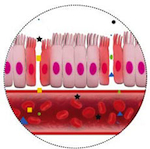The destructive nature of leaky gut syndrome
Posted on Saturday, September 01, 2012 by Dr. David Jockers
http://www.naturalnews.com/037033_leaky_gut_syndrome_flora_microorganisms.html
The digestive tract is loaded with trillions of microorganisms that form a natural ecosystem commonly called the gut flora. This ecosystem is designed to be symbiotic in that it benefits both the individual and the microbes. Certain lifestyle stressors throw off the natural symbiosis and cause a rise in pathogenic microbes, chronic gut inflammation and damage to the gut lining.
The digestive tract is a dark, moist environment that provides a steady stream of fluid and nutrition and is therefore an optimal breeding ground for microbes of all different types. There are approximately 500 different species of microrganisms within the gut. This makes up anywhere from three to six pounds of weight within the individual. The vast majority of these are beneficial and help metabolize food particles and form highly absorbable nutrients for the person to digest.
This internal ecosystem is dependent upon certain beneficial species being widespread and in control. These good bacteria are progenic in that they support life. These bacteria provide a protective barrier that guards the intestinal wall against pathogenic bacteria, parasites, fungi, viruses and environmental toxins. These organisms also create anti-microbial substances that destroy pathogenic organisms. They are very powerful, natural antibiotics, antivirals, and antifungals.
Humans would be unable to survive without a rich array of good bacteria. The critical species are the Lactobacteria that predominate the small intestine and the Bifidobacteria that predominate the large intestine. Humans depend on these organisms to absorb nutrients and fight against infection. These organisms also support the mucous membranes of the reproductive tract, respiratory system and sinus cavities. These organisms produce what is estimated to be about 83 percent of the bodies immune system.
Bacterial balance is passed down from the mother
We initially inherit and acquire our gut flora from our mother. The most important meal a newborn has is the exposure and inoculation of microbes as the baby travels through the mucous membrane of the vaginal canal. These microbes travel into the warm and moist areas of the baby and begin to form large, healthy colonies that support the formation of natural immunity. Gut flora continues to transfer over to the baby through breast milk.
The microbial foundation of the baby is determined by the microbial balance of the mother. Mothers with poor bacterial balance give their children an inherently poor survival ability from the start. These are typically the children that are constantly sick, have food and environmental allergens as well as neurodevelopmental and sensory processing disorders. Bottle-fed children are at the highest risk for poor gut function due to the toxic ingredients in typical bottle-based formulas. Breast feeding, whole-food based diet and natural toxin free lifestyle offer a significant defense against leaky gut syndrome.
When the gut flora is damaged from environmental toxins such as anti-biotic usage, chlorinated water, industrial meat, processed food and drinks, etc., it allows for the pathogenic species to take control. This would include Staphylococci, Streptococci, Bacilli, Clostrida, Candida Albicans, Enterobacteria and other parasites.
These pathogenic species eat through the intestinal wall and cause gaps in the gut lining. These gaps allow for large food particles, yeast, bacteria and environmental toxins to cross into the bloodstream. These things travel through the blood stream and lodge into joints, neural tissue such as the brain, the liver and other major organs. The immune system reacts by creating an inflammatory response in these areas. Due to the gut opening, the toxins continue to pour into the bloodstream and lodge in the body and the inflammatory conditions become chronic. This destroys brain, organ and joint tissue and rapidly ages the body.
